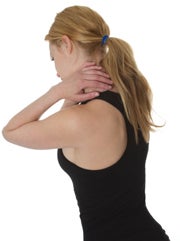Neck Pain
Neck pain is one of the most common reasons for a visit to the doctor. Most neck injuries result from overuse, ending with sprains or strains of muscle and tendon.
Rest, anti-inflammatory medication and time are often enough to relieve discomfort, but if the pain continues, it’s time to see a physician.
WakeMed’s orthopaedists work in collaboration with other physicians, nurses, neuroradiologists and rehabilitation specialists to develop an individualized treatment plan.
Symptoms of Neck Pain

In addition to pain in the neck, these are other possible symptoms:
- Numbness and tingling in the arm, fingers or hands
- Headache
- Shooting pain down an arm
- Loss of use or reduced coordination in an arm
- Stiffness in the neck
The intensity of the pain can fluctuate based on which part of the body is affected.
Types and Causes of Neck Pain
The neck is made up of seven bones, called the C1 through C7 vertebrae. These vertebrae are separated by intervertebral discs that allow movement in the neck and provide padding between the bones.
Within the spinal column — which begins in the neck and runs down the back — is the spinal cord. The spinal cord is filled with nerves supported by muscles and ligaments. Neck pain can be the result of problems with any of these areas.
Often, neck pain is simply the result of poor posture or overuse. But it can also be caused by conditions including:
- Degenerative disc disease, which is when the intervertebral discs collapse or lose their flexibility. Discs have a gel-like center, and as people age, the discs can dry out and lose height or tear.
- Herniated disc, or slipped or ruptured disc, occurs when the soft center and outer lining that surrounds the disc tears, resulting in some of the gel-like substance to leak through the opening.
- Myelopathy occurs mostly in older adults, and is related to cervical spine disease. It causes patients to have difficulty with balance and overall coordination, due to bone spurs or degenerative changes in the cervical spine squeezing on the spinal cord.
- Radiculopathy is a general description that we use to characterize pain, numbness and weakness in the arms, legs and hands. These symptoms are generally caused by a problem in the nerve roots. Patients with radiculopathy often have a herniated disc or degeneration in the spine that is irritating or causing swelling in the nerve roots.
- Spondylosis can occur when the discs between vertebrae slip or collapse. When this happens, spaces between bone and disc narrow or collapse, putting pressure on the facets of the bone. The facets also deteriorate, along with cartilage on the end of the bones. Often, bone spurs form and narrow the passageway for nerves in the spine, compressing the nerve and causing severe pain.
- Stenosis occurs when arthritis, disc degeneration, fracture or disease narrows the space in the spinal cord. Patients often have severe neck pain, limited neck motion, extremity weakness or balance problems. Stenosis is more common after age 50.
Diagnosing Neck Pain
Our doctors take a detailed history of symptoms and conduct a thorough physical examination to check for tenderness, numbness and pain in the neck area.
We may also order imaging tests, including X-ray, computed tomography (CT) scan, electromyography or magnetic resonance imaging (MRI). These tests help us visualize the internal structures in the neck, including nerves, spinal cord, bones and soft tissues.
Treating Neck Pain
Neck pain can sometimes resolve over time. When it doesn’t, neck pain can often be successfully controlled with conservative treatment:
- Bracing
- Cortisone injections
- Ice and heat
- Muscle relaxants
- Physical therapy
- Over-the-counter or prescription pain medication
- Rest
For patients who don’t receive relief from these treatments, surgery can be an effective option to resolve pain and discomfort.
Make an Appointment
We welcome new patients. If you’d like to meet with one of WakeMed’s orthopaedists about neck pain, please make an appointment by calling us at 919-232-5020.